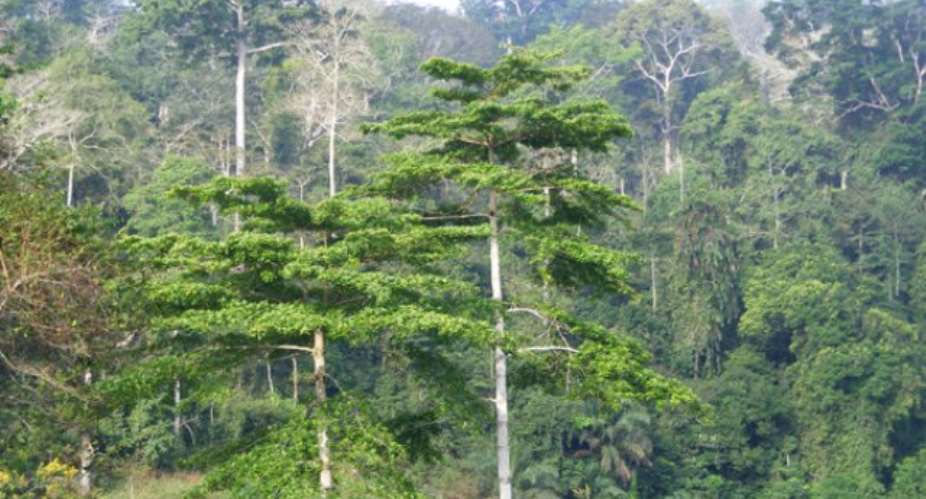A newly-launched international campaign demanding banks stop financing projects linked to biodiversity loss and social damage has incorporated Atewa Forest as a critical case due to the banking sector’s links to the proposed bauxite mining.
By providing finance, banks have a vital role in determining whether a proposed project goes ahead or not. As some of the most significant drivers of biodiversity loss and climate change are large scale projects such as mining and energy development, they need finance. By saying no to financing damaging projects in landscapes vital for biodiversity, ecosystem services and supporting local communities’ needs, banks can decide to stop contributing to this damage.
Recognising the banking sector’s critical role in environmental damage, the Banks and Biodiversity campaign aims to hold banks to account for the biodiversity and community impacts of their finance. It is doing this by urging banks to adopt a ‘No Go Policy’ that would mean they do not finance environmentally or socially damaging activities in or near sensitive areas.
The Atewa Forest case is one of nine highlighted by the campaign. As is widely known, Sinohydro is securing loans from the Industrial and Commercial Bank of China (ICBC), or any other bank it selects, to pay for Ghana’s infrastructure projects. These loans will be repaid with receipts from Ghana’s refined bauxite. Also well known is that Atewa Forest is one of the locations proposed for mining the required bauxite. Because of this, the Atewa Forest campaign has been requesting the ICBC and several other Chinese banks to reject any finance proposals linked directly or indirectly to bauxite mined in the Atewa Forest. This demand remains current: the ICBC or any other bank approached for financing should reject the requests until Atewa Forest is removed from the bauxite mining plans.

This call for rejection is now strengthened by the Banks and Biodiversity campaign, as the Atewa Forest case fits with 6 of the policy’s 8 No-Go areas:
- Area 1 covers landscapes recognised internationally for their critical biodiversity and ecosystem services. Atewa Forest is designated a Globally Significant Biodiversity Area as part of Ghana’s commitments to the Convention on Biological Diversity and also a Key Biodiversity Area (KBA).
- Area 2 covers landscapes recognised nationally or locally and protected by country laws or regulations. Atewa Forest is a Protected Forest Reserve under Ghana’s forest laws.
- Area 3 covers habitats with endemic or endangered species. Atewa Forest is a critical habitat for the endangered and endemic White-naped Mangabey, Afia Birago Puddle Frog, Atewa Dotted Border butterfly and many more besides.
- Area 4 covers intact primary forests and vulnerable secondary forests. Atewa is one of Ghana’s last remaining intact old growth forests.
- Area 5 covers free-flowing rivers unaffected by human activities. Atewa harbours the headwaters of three such rivers that provide clean water daily for 5 million Ghanaians both within the forest and downstream to Ghana’s capital Accra.
- Area 7 covers any area where the free, prior and informed consent (FPIC) of traditional communities has not been obtained, including sacred sites and/or lands with ancestral significance to local communities. Free, prior and informed consent has not been obtained, and this is evidenced clearly by the actions of the Concerned Citizens of the Atewa Landscape representing the many local communities resisting the proposed mining. Atewa Forest also contains sacred groves, chiefs’ burial grounds, and sacred animals.
The just-ended Finance in Common Summit in France has been targeted by the Banks and Biodiversity campaign with a letter to the French Development Agency and participating Public Development Banks to advocate for their adoption of the No Go Policy. Focused on ‘Building resilience for people and planet’, the summit intends to trigger support from the finance community for common action on climate change and the UN Sustainable Development Goals.
This follows the recent overwhelming international support for the IUCN resolution demanding urgent measures to safeguard the globally important Atewa Forest from bauxite mining. The resolution gained 5 African state member YES votes – 4 from Ghana’s neighbouring countries – and 31 Chinese NGO member votes – the second largest number of any individual country after the US – in support of the resolution. The No Go Policy strengthens the demands of the IUCN resolution and the wider Atewa campaign demanding that Atewa Forest must be protected from bauxite mining, and that no further bauxite-linked loans should be delivered to Ghana until Atewa Forest is permanently removed from the bauxite mining agreement.





 Tuesday’s downpour destroys ceiling of Circuit Court '8' in Accra
Tuesday’s downpour destroys ceiling of Circuit Court '8' in Accra
 SOEs shouldn't compromise on ethical standards, accountability – Akufo-Addo
SOEs shouldn't compromise on ethical standards, accountability – Akufo-Addo
 Father of 2-year-old boy attacked by dog appeals for financial support
Father of 2-year-old boy attacked by dog appeals for financial support
 Jubilee House National Security Operative allegedly swindles businessman over sa...
Jubilee House National Security Operative allegedly swindles businessman over sa...
 Nobody can order dumsor timetable except Energy Minister – Osafo-Maafo
Nobody can order dumsor timetable except Energy Minister – Osafo-Maafo
 Mahama wishes National Chief Imam as he clock 105 years today
Mahama wishes National Chief Imam as he clock 105 years today
 J.B.Danquah Adu’s murder trial: Case adjourned to April 29
J.B.Danquah Adu’s murder trial: Case adjourned to April 29
 High Court issues arrest warrant for former MASLOC Boss
High Court issues arrest warrant for former MASLOC Boss
 Align academic curriculum with industry needs — Stanbic Bank Ghana CEO advocates
Align academic curriculum with industry needs — Stanbic Bank Ghana CEO advocates
 Election 2024: We'll declare the results and let Ghanaians know we've won - Manh...
Election 2024: We'll declare the results and let Ghanaians know we've won - Manh...
